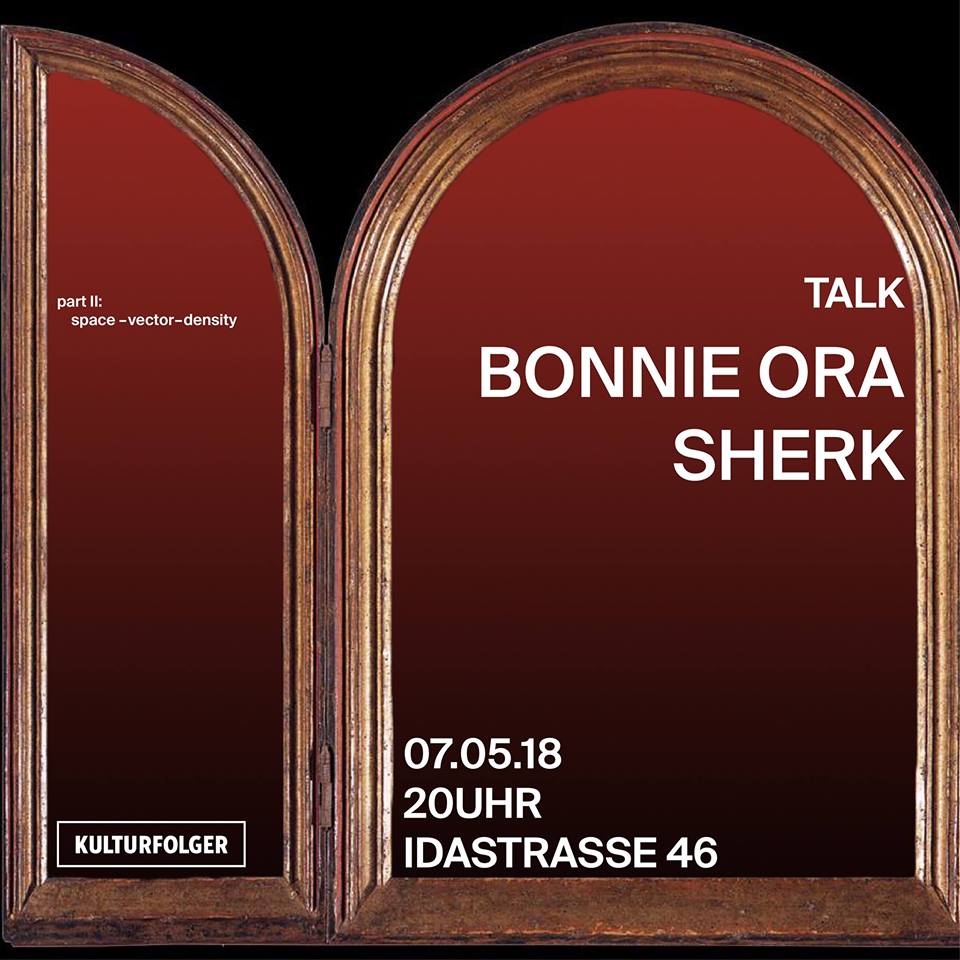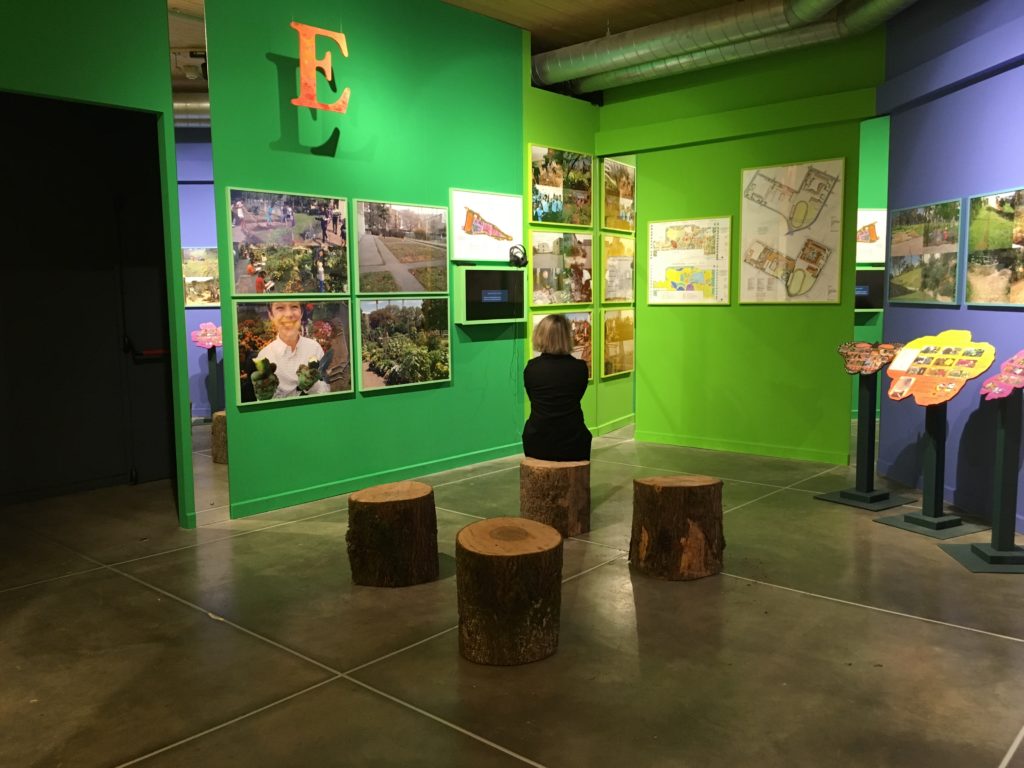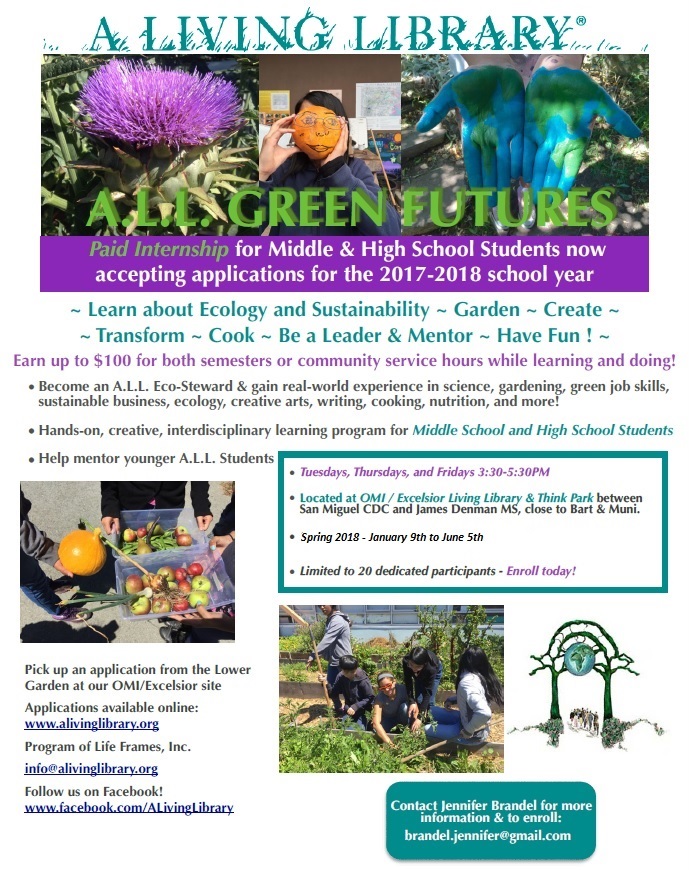ORIGINS OF A LIVING LIBRARY: FROM VISION TO NEW PLANETARY GENRE OF ART, LEARNING, INTERCONNECTIONS & TRANSFORMATION
Beginnings of A Living Library: Bryant Park, New York City
A Living Library, sponsored by nonprofit, Life Frames, Inc., was born in Bryant Park in the heart of New York City, adjacent to the Main Research Branch of the New York Public Library, in March of 1981. Founder, Ecological Artist, Bonnie Ora Sherk experienced the Park’s energy, observed its seedy, but formal elegance, and reflected on the ways in which the space was being used, abused, and underused.
“I often have an epiphany,” A Living Library Founder & Director, Bonnie Ora Sherk says, “and I see the simultaneity of everything happening at once, in its full flowering.”
Bryant Park sits in the heart of New York City, at 42nd Street and Fifth Avenue, with the United Nations to the East, and the Hudson River to the West, next to the Main Research Library. In 1981, it was known as “Needle Park”, due to rampant drug use and sales, and the artist envisioned how to transform it, creating a vital, new public environment.
That day in March of 1981 that she spent in the Park, was seminal to the evolution of this work. Sherk felt the energy of the place, and imagined what it might look like to bring the inside of the Library outside. She envisioned creating a powerful community space through a series of programmed landscapes that would engage all sectors of the community. “I wanted to attract and engage visitors with new, exciting Park experiences and programs, as well as with beautiful and interesting vistas.”
Master Plan for Bryant Park Living Library © Bonnie Ora Sherk, 1981-83 (Click here to enlarge image)
Utilizing the Park’s Beaux Arts elegance, Bonnie envisioned introducing themed, Gardens of Knowledge that would fit into the existing peripheral garden beds of the Park. They would become Learning Zones based on the Dewey Decimal System that would be developed around the Park, “which fit perfectly in the existing spaces,” and engage diverse communities in their creation and use.
Within each Garden, visitors would find Plants Related To Each Subject, Programs of Lectures, Demonstrations, Visual and Performed artworks, Research Institutes, and Green-Powered Digital Gateways, that would bring the inside of the Library outside, and also enable this site to be linked to Branch Living Library sites in diverse communities of the world. Each of these themed Gardens would be a vehicle for including community participation and learning for all ages.
A few Photo Montages below, show some of the envisioned, themed, Gardens of Knowledge and other features, that the artist created in 1983, to better describe her concepts visually, so people would understand them.

Entrance To Bryant Park Living Library © Bonnie Ora Sherk 1983

Literature Garden © Bonnie Ora Sherk 1983

Mathematics Garden © Bonnie Ora Sherk 1983
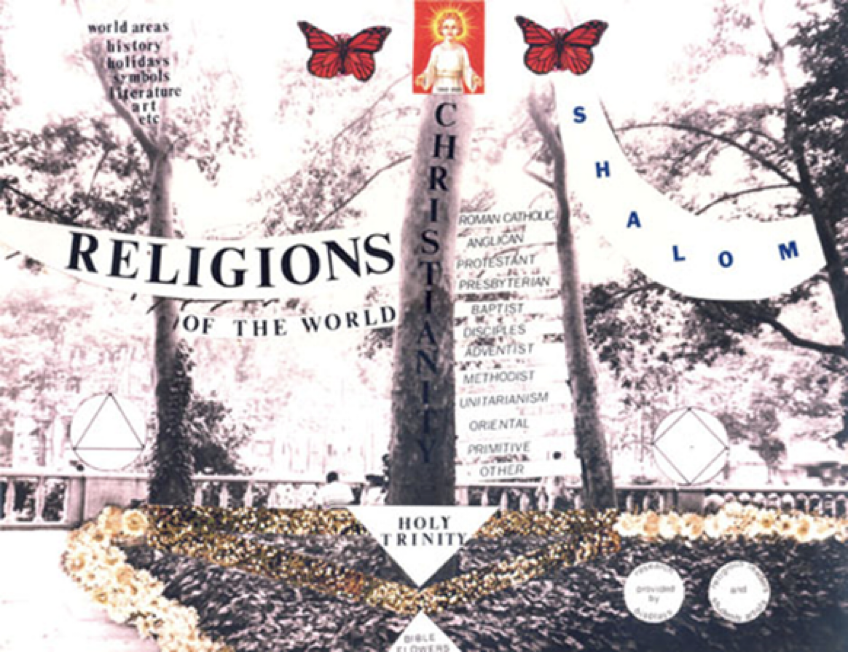
Religions Of The World Garden © Bonnie Ora Sherk 1983
Flanking a central grassy area surrounded by hedgerows of roses and berries, International Gardens would represent styles and methodologies from around the world. These gardens would also invite participation from diverse Consulates, Embassies, and the United Nations.
Together, all elements would link the Library to its neighbors, to schools, and to other cultural and arts organizations - from local to regional, to national and international ones.
“As I had this epiphany, I thought, this would become The Living Library, and I became very excited. Then I realized that to call it, The Living Library, would be an insult to its neighbor, the New York Public Library. So I thought, I’ll just call it A Living Library, meaning another. And then I became even more excited and happy, as I realized the initials spelled A.L.L., which is the embodiment and meaning of what I was envisioning. I felt this was a gift from the universe, and I knew that I was on to something very profound and gorgeous.”
Moving from Original Plan & Concept to Practice
The meaning and metaphor of A Living Library centers on a powerful premise and metaphor:
People, Birds, Trees, Air, Water, and all the things we create, are part of A Living Library of diversity: Parks, Gardens, Schools, Curricula, Libraries, Artworks, Networks, Communities. As such, Culture and Technology are part of Nature. It’s all Nature.
 A.L.L. Tree of Knowledge © Bonnie Ora Sherk 1990
(Click here to enlarge image)
A.L.L. Tree of Knowledge © Bonnie Ora Sherk 1990
(Click here to enlarge image)
Since A.L.L.’s Bryant Park conception, Branch Living Library & Think Parks have been established in New York City and across San Francisco, with more and more communities around the country and the world expressing interest in beginning their own unique, place-based, Branch Living Library & Think Park.
The Think Park is meant to make us more empathetic to ourselves, each other, and all species.
It’s ideal when people wanting to establish a Branch Living Library & Think Park in their community come to Life Frames, Inc., the non-profit sponsor of A.L.L. that Sherk established in 1992, or to Sherk, directly. For example, several of A.L.L.’s Branches with schools in San Francisco and NYC were initiated by a request to the artist, by the school’s principal.
Each new site always requires a period of study – Research and Planning with community members – before Design can begin. “An understanding of the local place and its resources is essential, and really informs all that we do. A Living Library Framework of Linked Local Resources is incorporated: Human, Ecological, Economic, Historic, Technological, Aesthetic Resources – seen through the lens of time – past, present, future –and studied by the community. This early Research Phase becomes a valuable Learning Program for the community, and informs the Planning and Design Phases of developing a Master Plan.”
Equipped with the A.L.L. Framework, and Sherk’s hand-drawn Community Master Plans that evolve from the process, participating groups embark on place-based, greening projects that become life-long, learning landscapes, demonstrating acts of beauty, profound hands-on learning, and performances of Being. Often, these transformed sites help solve local problems like flooding, watershed rejuvenation, issues of climate change, and transformation of underused, barren, concrete and asphalt environments.
Sherk invented a new term to describe this work: Funcshuional Art. “This practice is a planetary genre of art that marries the so-called Functionalism of the West, with Eastern, Northern, and Southern Cultures Spiritualism, Alignment, and Feng Shui, and Indigenous Cultures world-wide.”
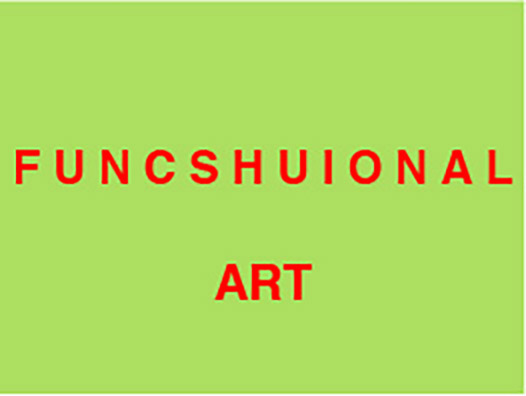 Conversations about her work are peppered with these terms - words that repurpose language. “I had to create a way to describe the work with a language, so I could write and talk about what I’m doing,” she explains. “There weren’t words to really describe it yet, so I had to invent new ones.”
Conversations about her work are peppered with these terms - words that repurpose language. “I had to create a way to describe the work with a language, so I could write and talk about what I’m doing,” she explains. “There weren’t words to really describe it yet, so I had to invent new ones.”
Through an extensive body of work, including the decades-long development of A Living Library and prior works, Sherk has sought to transform environmental consciousness along with forgotten spaces. Barren and abandoned sections of cities have been nurtured back into healthy and resilient landscapes. Through design charrettes, workshops, green skills job training, and integrated school programs for all ages, community members participate in, and sustain these Branch Living Library & Think Parks.
Interested in learning more? Explore in more detail the Bryant Park Living Library through the Photo Montages the artist created in 1983, hosted by Dinter Fine Arts here, and read more about A.L.L.’s evolution through an article about Sherk’s work in the context of ecofeminism in the Art in America, May, 2020 issue, here.
Some examples of Branch Living Library & Think Parks are shown below:

OMI/Excelsior Living Library & Think Park Streetscape Transformation – During, After © Bonnie Ora Sherk 1999-2005



James Denman Rear Yard Ecological Transformation, Before, During After © Bonnie Ora Sherk 2017-2018
Expanding the Vision
This past year, a public health crisis kept us all inside. While we renegotiated relationships to our neighborhoods and local spaces, the world grew more digitally connected than ever. Meanwhile, we’ve had to evaluate our individual and group actions as we continue to witness the impacts of climate change on communities—others’ and our own.
Maybe it’s these layered contexts that make Bonnie’s work feel especially timely.
“The processes and purpose behind A Living Library evolve from systemic, ecological design, and through the transformation of places, we can also transform consciousness of people in these places. Systemic efforts work best when they begin locally and incorporate local resources. Later, Branch sites can be linked globally through Green-Powered Digital Gateways, into a meta- structure of A.L.L., so we can see the commonalities and diversities of cultures and ecologies from around the world, and celebrate and share. A.L.L. establishes a layering of knowledge and relationships.”
And with developing partnerships in Liverpool, England, Lisbon, Portugal, Huesca, Spain, and Chongqing, China, to name a few places, A.L.L’s international presence is only growing.
NEXT STEPS
What does Bonnie envision next in the expansion of A Living Library network? Actualization of Green-Powered Digital Gateways !!
“We need innovative communication platforms that interconnect Branches and promote sharing of diverse ecologies and cultures. Then we can begin to approach a much better planetary understanding of the different systems in Nature, and what it takes to keep them in balance, and what we have to offer in each unique community.”
 Green-Powered Digital Gateway 8
© Bonnie Ora Sherk, Drawing, Collage 2016
Green-Powered Digital Gateway 8
© Bonnie Ora Sherk, Drawing, Collage 2016


